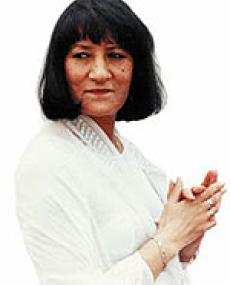
Sathima Benjamin was born into a humble family in Claremont, Cape Town in 1936. Deeply influenced by the cosmopolitan culture she grew up with in the shadows of Table Mountain, her youth was soon to be shattered by the declaration of her beloved birth-place as a ‘white area’.
By the early 1960s, Benjamin was a talented jazz singer and in great demand in music and theatre. Yet as apartheid laws were implemented, black performers found it increasingly difficult to earn an income, or to maintain a sense of dignity in the face of overt racism.
With limited career opportunities, performers were forced to endure separation of audiences and facilities. As with so many of her contemporaries, Benjamin found herself on foreign shores where she felt she could fully explore her art, first touring with the Jazz Epistles in Europe in 1962.
In early 1963, while Benjamin was performing with fellow Cape Town expatriate and pianist Abdullah Ibrahim in Zürich, she met the legendary Duke Ellington. Later, Ellington supervised several recording sessions at the famous Barclay Studios in Paris, with Benjamin’s singing accompanying the Dollar Brand Trio, with Ellington and Billy Strayhorn as second and third pianists.
From the early 1960s, Benjamin toured the world, becoming well known in jazz circles and a regular feature at musical festivals. Invited to sing with Ellington’s band at the famed Newport Jazz Festival in New York, Benjamin was attracted to the city’s cosmopolitan nature, which in some way reminded her of her home town. She settled there in the mid-1960s, and established herself as a leading exponent of her musical genre. Her uniquely modest stage presence and understated vocalizing made her a sought-after jazz singer.
In New York, Benjamin also took up the fight for liberation, assisting the ANC with fundraising concerts to raise awareness of the struggle. She has recorded more than ten albums, and in 1997, after the long-lost original tapes of the legendary recordings with Duke Ellington in Paris were discovered, an album was finally released to much critical acclaim.
This album was finally released thirty four years after its first recording, and captures Benjamin’s sublime and captivating voice as a young performer in a repertoire of subtle ballads, accompanied by no fewer than three of the world’s greatest jazz pianists: Abdullah Ibrahim, Duke Ellington and Billy Strayhorn.
Benjamin has added to the genre of jazz and jazz vocalization, and her contribution to music in South Africa and the world is truly superlative. She therefore remains a standard whereby other emerging female jazz singers still measure themselves.
Benjamin is married to the great South African composer and pianist, Abdullah Ibrahim, with whom she has two adult children. She runs her own independent record company, Ekapa, which records and distributes jazz music. Benjamin alternates between her adopted city, New York and her home in Cape Town, occasionally performing on other continents.
The South African Government bestowed Sathima Bea Benjamin with the Order of Ikhamanga in Silver at the National Orders awards on 19 October 2004 for her excellent contribution as a jazz artist in the development of music in South Africa and internationally, and for her contribution to the struggle against apartheid.